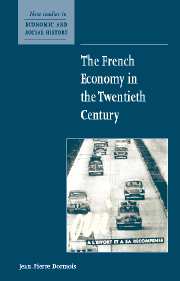Book contents
- Frontmatter
- Contents
- List of figures
- List of tables
- Preface
- List of acronyms
- 1 The end of French exceptionalism?
- 2 French economic performance in international perspective
- 3 France and the wider world
- 4 The changing face of Colbertism
- 5 The institutions of French capitalism
- 6 Labour: the French at work
- 7 Plough and pasture: lifeblood or drain?
- 8 Industrialisation, de-industrialisation, postindustrialisation
- Conclusion
- Glossary
- A national portrait gallery of twentieth-century France
- Bibliography
- Index
- Titles in the series
7 - Plough and pasture: lifeblood or drain?
Published online by Cambridge University Press: 14 January 2010
- Frontmatter
- Contents
- List of figures
- List of tables
- Preface
- List of acronyms
- 1 The end of French exceptionalism?
- 2 French economic performance in international perspective
- 3 France and the wider world
- 4 The changing face of Colbertism
- 5 The institutions of French capitalism
- 6 Labour: the French at work
- 7 Plough and pasture: lifeblood or drain?
- 8 Industrialisation, de-industrialisation, postindustrialisation
- Conclusion
- Glossary
- A national portrait gallery of twentieth-century France
- Bibliography
- Index
- Titles in the series
Summary
For most of the twentieth century French school children were taught a quotation attributed to the Duke of Sully (1559–1641) to the effect that ‘plough and pasture are the lifeblood of France's economy’. This early ‘physiocratic’ affirmation of the supremacy of agriculture over other economic activities curiously survived into the late twentieth century despite the ever-dwindling importance of farming in modern, industrialised economies. Although endowed with some of the best soils in Western Europe, France failed to achieve self-sufficiency in major foodstuffs until the 1960s (by which time the diversification of tastes was making this objective pointless). Fortunately (?) the CAP (Common Agricultural Policy), implemented in 1962, came to its rescue by granting French agriculture a second lease of life, and promoting France to the position of ‘agricultural superpower’ in Europe and the second largest exporter in the world. Recently, however, EU budget constraints and the industrial methods developed in animal farming (as well as the damage done to the environment) have cast doubts on the sustainability and ultimate soundness of a policy of massive public support to agriculture ‘at any cost’.
A ‘ruralist utopia’
Something curious happened between the middle of the nineteenth and the middle of the twentieth century: France, unlike many comparable European countries, maintained, even after the initiation of industrialisation, a relatively high and stable labour force in agriculture. In 1936 there were about as many people employed in farming as there had been in 1866.
- Type
- Chapter
- Information
- The French Economy in the Twentieth Century , pp. 101 - 111Publisher: Cambridge University PressPrint publication year: 2004

